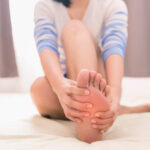No woman looks forward to their period. The bleeding. The tender breasts. The crushing fatigue and a foul disposition. Those abdominal cramps are no picnic either. Then, as if all of that weren’t enough, your stomach swells up like a balloon, and you can barely zip up your pants.
There’s good news, though. One, you are not alone. Bloating is an incredibly common symptom that affects 70 percent of women during their period. Two, many simple ways to relieve and reduce uncomfortable bloating occur when it’s that time of the month.
Here are 13 easy ways to decrease bloating on your period…
Avoid Gassy Foods

Some foods are difficult for the body to digest and tend to cause gassiness. When you’re on your period, and just before, it is best to avoid these foods. More gas equals more bloat and more discomfort.
Foods that are known to cause gas and stomach bloating include cow’s milk, potatoes, beans, lentils, and corn, as well as vegetables such as broccoli, cauliflower, cabbage, and Brussels sprouts.
Limit Salt

A pinch of salt here and there at meal times is fine, but having high levels of sodium in the body contributes to the stomach bloating that occurs naturally at red robot time due to hormonal changes.
When we consume significant quantities of salt, the body reacts by retaining water to prevent dehydration. This fluid retention worsens bloating and increases discomfort during/before menstruation.
Consume Potassium and Healthy Fats

Foods high in potassium promote fluid balance inside the body, preventing bloating. You can up your potassium intake by eating foods like bananas, cantaloupe, asparagus, and tomatoes.
Healthy fats are also good for reducing stomach bloating. Foods like salmon, chia, and nuts help to lower prostaglandins. These are hormone-like substances that cause muscle contraction and bloat.
Eat Smaller Meals

Want to reduce bloating? Eat less food. That is, at each sitting, not in total. The more you eat at one time, the longer it takes for your body to digest your food. Undigested food ferments and causes gas.
Instead of two or three large meals daily, eat five or six smaller meals when you’re on your period. This way, you get the same amount of nutrients into the body but avoid stomach bloating.
Take an Anti-Inflammatory

Bloating worsens with inflammation. Thus, taking anti-inflammatory drugs like Naprosyn and Ibuprofen (Midol and Aleve) can be helpful if you have a tendency to experience uncomfortable period bloat.
To effectively reduce period bloating, medical experts recommend taking 200-400 milligrams of an anti-inflammatory medication every six to eight hours a few days before menstruation begins.
Pop a Probiotic

Probiotic supplements can reduce period bloating by keeping the digestive tract healthy and regular. The probiotic strain Bifidobacterium infantis is said to be particularly effective at reducing bloat.
When shopping, check the labels on probiotic supplements and food items that contain the B. infantis strain. You can also consume more foods known for their high probiotic content, such as yogurt.
Steer Clear of Carbonated Beverages

Drinking fizzy soft drinks when it’s your time is a bad idea, even if it does provide some form of temporary relief. The bubbles in these carbonated beverages can make your stomach blow up.
Sugary sports drinks and beverages that use artificial sweeteners (ignore the marketing and health claims on the labels) should also be avoided if you want to reduce bloating on your lady time.
Don’t Chew Gum

Gum chewing causes you to swallow more air than you’re supposed to, which can contribute to abdominal pain, bloating, and other gastrointestinal issues around period time.
If you’re in the habit of chewing gum, then substitute it temporarily with sucking on some hard candy like a piece of mint. Alternatively, opt for high-fiber snacks, such as low-fat popcorn.
Cut Back on Alcohol and Caffeine

Leading up to your period, alcohol consumption can intensify PMS symptoms like mood swings, tenderness in the breasts, and stomach bloating, so it is wise to avoid drinking during this time.
Caffeine from coffee can worsen bloating, too. In addition to dehydrating the body, which causes water retention, it overstimulates the digestive tract and irritates the bowels.
Hydrate with Water (And Add Lemon)

Drink water to minimize bloating. As mentioned, dehydration causes water retention. It makes the body naturally hold on to extra fluids in your system to compensate for the lack of incoming water.
Adding a few lemon slices can boost your water’s bloat-fighting powers. The lemon stimulates the body’s gastrointestinal juices and promotes proper digestion, keeping your belly flat.
Exercise

While working out is normally the last thing women want to do when they are sore, tired, and uncomfortable, getting exercise is one of the best ways to alleviate PMS symptoms.
Exercising boosts blood circulation and revs up the digestive system. This helps to relieve bloating symptoms. Stick to lighter workouts, though, as high-intensity exercises can have the opposite effect.
Calm Your Nerves

Lavender smells great. It’s also a good PMS remedy. The fragrant herb’s antispasmodic effects soothe the nerves in the digestive system, and it contains polyphenols that help to reduce bloating.
According to researchers, inhaling lavender for just 10 minutes causes a significant positive change in parasympathetic nervous system activity. Pour a few drops of the essential oil into a hot bath.
Sleep More

The body needs sleep for many different important functions, one of which is digestive maintenance. When we sleep, the body repairs itself, and excess fluid from the belly is processed for removal.
In other words, you can reduce bloating by getting enough sleep. How much is enough? Most healthy adults need between seven to nine hours of sleep each night to function optimally.







